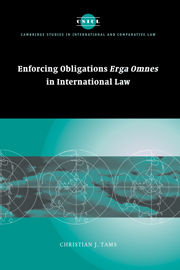Book contents
Conclusion
Published online by Cambridge University Press: 24 July 2009
Summary
The present study began by noting two dominant features of the on-going debate about obligations erga omnes: (i) the strong views provoked by the concept, and (ii) the lack of agreement about basic issues. Having addressed some of these basic issues, one can hardly avoid the conclusion that the former are the main source of the latter. Throughout the present study, strong feelings about the obligations erga omnes concept have resurfaced in the form of assertion or legal argument. If the concept is still ‘very mysterious indeed’, this is largely due to hopes and fears that commentators project onto it, and that often stand – to borrow a comment on an equally mysterious area of international law (namely recognition) – ‘like a bank of fog on a still day, between the observer and the contours of the ground which calls for investigation’. Three different fog banks (or myths) have been encountered throughout the preceding chapters, and need to be briefly commented on: the idealist myth, the realist myth, and the myth of uniqueness.
The Idealist Myth: Clearly discernable in many debates about obligations erga omnes is the voice of idealism – the conviction that the erga omnes concept marks a paradigm shift towards a better international law, a value-oriented constitutional order. Based on an idealist reading, erga omnes effects are often simply taken for granted, or deduced from the perceived nature of the concept: all States naturally have standing to institute ICJ proceedings; all States naturally can take countermeasures in response to breaches; finally (a structural variation of the idealist theme) all obligations in the field of human rights or environmental law are naturally valid erga omnes.
- Type
- Chapter
- Information
- Enforcing Obligations Erga Omnes in International Law , pp. 306 - 311Publisher: Cambridge University PressPrint publication year: 2005

